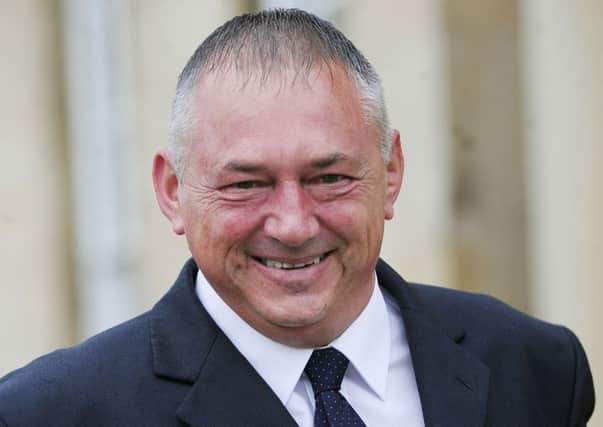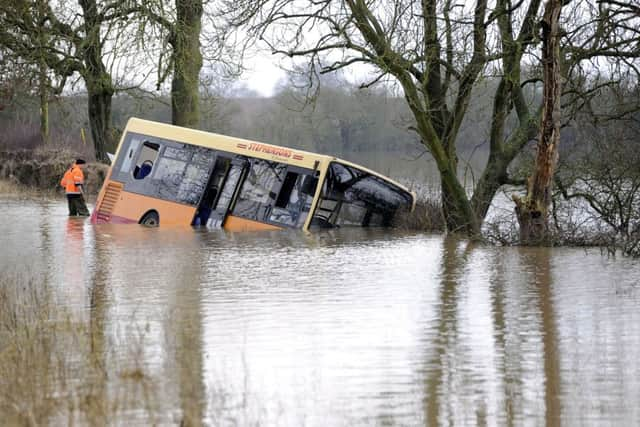School bus driver who stranded 23 children in floods is jailed for a year


Former soldier Graham Jones, 53, told York Crown Court he made a “genuine mistake” when he drove the children, aged between 11 and 18, into floods on a country road in North Yorkshire after passing two road closed signs, leaving the bus stuck in thigh-deep water and passengers having to be rescued by firefighters.
But a jury found him guilty of dangerous driving on Friday after deliberating for about an hour.
Advertisement
Hide AdAdvertisement
Hide AdJudge Paul Batty QC told Jones that he did not understand why he had not pleaded guilty to the offence given the overwhelming evidence against him.


The judge told him he displayed “vaunted arrogance” in the witness box as he tried to explain to the jury why he took the schoolchildren from the village of Newton-on-Ouse, near York, through one flooded area of Tollerton Lane and then into an even deeper stretch, which the judge described as “an expanse of water as far as the eye could see”.
Judge Batty said: “God knows why you drove through and, of course, the inevitable happened.”
He said: “God knows what the children were thinking about as this was happening.”
Advertisement
Hide AdAdvertisement
Hide AdJudge Batty told Jones he showed no appreciation of the danger he put the children in and “the potentially devastating consequences that could have occurred because of your dangerous, your reckless act”.


He said: “This was an extremely bad case of dangerous driving. The consequences that could have followed simply do not bear thinking about.”
Jones told the jury of seven men and five women that he went through the first section of floodwater on January 5 because he thought it was shallow enough not to cause him any problems.
But he said that when he entered the second section, he realised water was coming in through the side door of his bus.
Advertisement
Hide AdAdvertisement
Hide AdJones said he put the vehicle in reverse but the bus began to move sideways until it got stuck in a roadside ditch.
He said both he and the children were traumatised by what happened as firefighters had to wade into the water to carry everyone on board to safety.
Jones said some of the teenagers broke a window as he tried to reassure them and urged them to stay on the vehicle until help arrived.
“It was a genuine mistake,” he said.
And he added: “I did not put the children’s lives in danger. No, I did not class it as dangerous.”
Advertisement
Hide AdAdvertisement
Hide AdJudge Batty told prosecutors that the quick-thinking teenager who phoned the emergency services from the bus should be identified and granted a £50 reward from public money.
He also told Jones, who was convicted of drink-driving in 1999, that he will be banned from driving for four years.
The judge said he had taken into account the defendant’s exemplary record as a soldier for 23 years and, after that, his service for a further 11 years providing security for RAF bases.
Judge Batty told Jones that the incident happened after floods of “Biblical proportions” in the York area and as the children, who were heading for Easingwold School, were starting their first day back after the Christmas holidays.
Advertisement
Hide AdAdvertisement
Hide AdHe said the area was notorious for flooding and he did not accept Jones’s evidence that he did not see one of the “road closed” signs.
And the judge said he “utterly rejected” the defendant’s claim that the water had got deeper by the time police filmed the road three hours after the incident.
Earlier, Julian Tanikal, defending, said: “He has been genuinely upset by the predicament he put those children in.”
Mr Tanikal asked for his client’s prison sentence to be suspended but Judge Batty refused.
Advertisement
Hide AdAdvertisement
Hide AdHe told the judge that Jones lost his job with Stephenson’s of Easingwold after the incident but the firm gave him a reference and he was later employed as a driver by a firm in Harrogate.
Jones, of Linton Woods Lane, Linton-on-Ouse, was found guilty of one charge of dangerous driving after a one-day trial.
Wearing a dark grey suit, a white shirt and a black-and-white striped tie, he showed no emotion as the verdict was delivered and the sentence was passed.